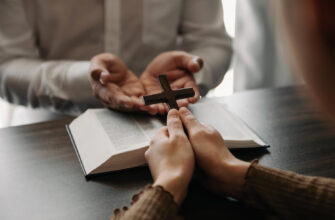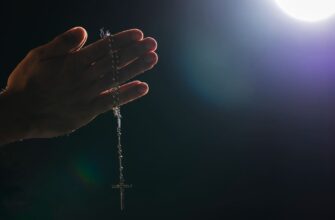Yes, Catholics read the Bible – just like all other members of the Christian faith.
While Catholics (like most Christians) have always valued the Bible very highly, there has been a bit of history with certain segments of the Catholic Church that haven’t necessarily encouraged those of the Catholic faith to read and study it the way other Christians might.
Today, though, there has been a bit of a resurgence across the Catholic faith when it comes to reading and studying the Bible on a more consistent basis.
Do Catholics read the Bible regularly? According to research published by the Pew organization about 25% of all Catholics read their Bible at least once a week.
That might not be quite as many Catholics reading their Bible weekly as those of the Evangelical Protestant faith (63% of these Christians report reading their Bible once a week according to Pew as well), but it’s not an insignificant number, either.
More and more Catholic leaders are encouraging members of their church to read their Bibles more, to study their Bibles more deeply, and form a very real relationship with this book of faith.
How Often Do Catholics Read The Bible?
As we alluded to a moment ago, there certainly was some historical precedence for the stereotype of Catholics not reading their Bible to exist.
Protestants have always had a global reputation for reading the Bible more than Catholics, but the reasoning behind this isn’t as obvious as you might think.
No, Catholics reading the Bible at lower rates compared to Protestants has nothing to do with Catholics not believing in the Bible, not embracing the Bible, or not considering the Bible to be an important part of their faith.
Instead, the cold hard reality is that literacy rates in the Catholic Church were quite low throughout history.
The Catholic Church existed for more than 1500 years before the Protestant Reformation in the 16th century and literacy rates were (generously) estimated to be 20% at their highest during this time period.
Truth told, for the first 1500 years of the Catholic Church the overwhelming majority of people never had their own version of the Bible to read to begin with. They went to church and heard the word.
When the printing press came into being (around the time of the Protestant Reformation) Bibles could be more easily disseminated and literacy rates exploded.
This helped to make regular Bible study a cornerstone tenant of the Protestant religion.
On top of all of that, there were some in Catholic leadership that believed “regular people” should not be reading the Bible on their own, should not be trying to interpret the Bible on their own, and should instead be guided through the Catholic faith by members of the Catholic Church.
This idea has fallen by the wayside quite a bit in modern times, but it was still a core tenant of parts of the Catholic Church up until maybe 100 years ago or so.
Catholic Leaders Encourage Bible Study Today
Today, though, most Catholic leaders believe that more people should be spending time reading their Bible, studying their Bible, and talking to other Catholics about their faith and what they’ve learned from Scripture.
Catholicism has always been firmly rooted in Scripture, which makes the accusation that Catholics don’t read the Bible a little limp, but the modern church is at least acknowledging that there hasn’t been quite as much of a push to read and study the Bible in the past as there is right now.
How Should Catholics Read the Bible?
There are more resources available today than ever before for Catholics looking to deepen their faith and learn more about Catholicism through their Bible.
Those looking to get started, though, need not look for outside resources to help them out (at least not right away).
Catholics can get solid guidance on reading and understanding their Bible by reading the Catechism of the Catholic Church.
Sections 112 through 114 really break down the best ways to study your Bible, especially if you are coming to it with fresh and new eyes.
Section 112 specifically says that Catholics should pay attention to the content and the unity of the entirety of the Bible and Scripture itself. It’s important to look at both the Old and New Testaments and find commonalities between them.
Section 113 says that Catholics should interpret the Bible through the living tradition of the Catholic Church. Section 114 goes on to describe that Catholics should focus on the analogy of faith throughout the Bible.
As always, Catholics are encouraged to speak to a member of their church for more specific help if they’re looking to get deeper into their Bible and their faith.







